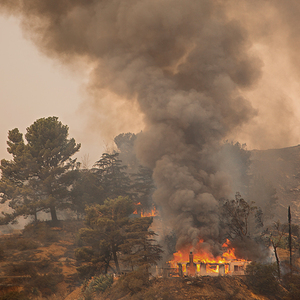Between yesterday and today, at both our HD and Lowes the price of OSB went up $1 per sheet for the exact same stacks of material they had yesterday (minus a couple of sheets).
Is this price gouging? When asked, the guy at Lowes said that “they had no control over the prices, it was whatever the market would bear.”
We went to buy today for a shed roof we’re building, because we thought there might be some shortages next week because of Frances, but we didn’t figure they’d already be upping the price!
We’re headed to the lumberyard to buy now. Their price is a bit more than either of the big boxes, but at least it’s the same price it was yesterday.
Leigh



















Replies
Lumber and plywood are commodities. Their prices are determined by market conditions.
Every time there's a hurricane the prices go up. People panic buy stuff they don't necessarily need. People buy on speculation that prices will skyrocket. And obviously people in the path of the hurricane buy large amounts of plywood. So the prices go up nationwide.
It's a fact of life. You're not going to change it. So live with it.
A synonym is a word you use in place of one you can't spell.
Lumber and plywood are commodities. Their prices are determined by market conditions.
This I understand. No choice but to live with it, but still think it's a lousy thing to do, especially with the attitude we got from the guy at Lowes. We will need the OSB next week, and had been told they might have a hard time getting in stock, so were buying it now.
Their cost didn't go up on what they had in stock, after all. The lumberyard said they would have to charge more when they got their next shipment because it was going to cost them more, but the price on what was in house would remain the same.
Yet another reason to patronize the lumberyard over the big boxes.
Edited 9/3/2004 2:15 pm ET by aberwacky
It depends on the how rappidly prices change and how much. But there are strong arguments for charging way that Lowes is. Specially for something like OSB that will probably jump up for a couple of weeks and then come back down.
There are two things here. One that "need" the money to buy new stock at the higher prices.
But also when prices drop they have some of the expensive material in stock and will have to drop prices and take a loss on it.
"Their cost didn't go up on what they had in stock, after all."
There are 2 basic theories on pricing lumber comodities.
First is "replacement cost" pricing. Basically they figure that they're going to keep "X" number of sheets of plywood in stock. If someone buys plywood today, they have to go out and replace it. So they change their prices frquently according to market fluctuations.
The second is "Average moving cost" pricing. They take the average of maybe their last 5 purchases and use that cost to figure their selling price.
The second one used to be the most common, I think. But more and more everyone is trending towards the first one as prices become more and more unstable, and margins get tighter.I watch the harvest... learning from the earth of what it is to give and give again, and only in that giving to grow whole.
> Every time there's a hurricane the prices go up. People panic buy stuff they don't necessarily need.
Why don't people in hurricane country buy their board-up stuff in the winter and have it in the garage until they need it?
-- J.S.
JS,
these are people who choose to live in hurricane country.
Foresight is not one of thier strengths.
:)Mr T
Happiness is a cold wet nose
Life is is never to busy to stop and pet the Doggies!!
In the US, you take your pick. Do you want to live in:
1. Hurricane country
2. Tornado country
3. Earthquake country
4. Volcano country
(or several of the above)
Not sure where you go to be natural disaster free.
jt8
You left out a several.
Floods, firestorms, and earthslide areas.
Not to mention winter storms.
No hurricanes here. We do get wind, sometimes very high wind. You may have seen discussions here about the wind in and around Boulder. But we never get rain with the really severe winds.
I live right up against the mountain, so no tornados. In the 24 years I've lived here, there's never been a tornado closer than about three miles northeast of here. I heard a story one time about a tornado west of Ft. Collins, but generally they don't seem to form in or very close to the mountains.
Earthquakes and volcanos are a possibility. The Rocky Mountains didn't get to be two miles high without some vigorous earth movement. But the current state of geological knowledge suggests little or no seismicity for many millions of years around here.
Twenty plus feet above the creek, so no flooding.
No dense forests in or near town, so firestorms are unlikely.
Is mildew a natural disaster? Doesn't happen here. Too dry.
No termites, fire ants, kudzu, slugs, etc. I don't know if that's because it's too dry or because it freezes every winter.
The only other thing I can think of is hail, and we do get that from time to time. There was a hail storm about 12 years ago that destroyed a bunch of roofs and damaged a bunch of cars in the Denver metro area. But you hardly ever hear of anybody dying in a hail storm. (I did read about a storm in Montana once that killed over 300 sheep with baseball size hail.)
What about Bigfoot? He lives around there somewhere doesn't he?
I thought he lived in one of the Pacific coast mountain ranges. Never heard of any sightings in Colorado.
UD
Your making a prety good argument for more people moving to Colorado!!!
You need that?
Dunc,
Just saying hi. I'm near Fort Collins, Windsor, actually, and like our annual climate. Funny, half of the people I talk to from other states think we get mass amounts of snow. Do you build in Boulder? I've heard that the wind can really howl down from the Flatirons. I build alot of fence, and know that footers for them need to be pretty deep around Boulder.
There was another hailstorm in 78 I think that was pretty hairy. I was only 8 then but was doing my paper route. Some of those stones were baseball size.
Cole
Cole Dean
Dean Contracting
I happened to be passin thru that hailstorm, on our way to Telluride...thank god for a BIG fat sleeping bag...saved the windshield. I got pelted pretty bad, the Dodge was a '58 delivery wagon, lotsa heavy steel back then, no real bad dents. I saw other cars pulled over that were totalled.
Spheramid Enterprises Architectural Woodworks
Repairs, Remodeling, Restorations.
How about meteors? A woman in England got hit with a golf ball sized one while gardening a couple of weeks ago...
Erich
Rockslide? Drought?
Or maybe the worst of all natural disasters.... Over priced property and outrageously high cost of living.
jt8
Uh...New York City?Dinosaur
'Y-a-tu de la justice dans ce maudit monde?
no such thing as price gouging
http://www.townhall.com/columnists/walterwilliams/ww20040324.shtml
http://www.townhall.com/columnists/walterwilliams/ww20020626.shtml
Marine Engineer
Florida has an 'anti price-gouging' law. After a disaster, retailers cannot raise prices, despite added costs of doing business (disrupted supply lines, labor supply, wholesaler/distributor price increases from demand, etc.). They have to make up for this somewhere, and you now know where!
The whole thing may backfire, however. There is little incentive for local suppliers to make heroic efforts to obtain scarce materials from far away if they can't raise prices to cover their costs. If I were in a disaster zone, I would rather pay 3x more for plywood than have none available at all.
"Florida Statute 501.160 states - It is unlawful during a state of emergency to sell, lease, offer to sell, or offer for lease commodities, dwelling units, or self-storage facilities for an amount that grossly exceed the average price for the commodity the thirty days before the declaration of the state of emergency or the seller price for the commodity the thirty days before the declaration of the state of emergency unless the seller can show increases in its prices or market trends justifying the price. Examples of necessary commodities are food, ice, gas, oil and lumber. This is a civil crime enforced by the Attorney General, the Department of Agriculture and Consumer Services and State Attorney."
http://myfloridalegal.com/pages.nsf/Main/5D2710E379EAD6BC85256F03006AA2C5?OpenDocument
Edited 9/3/2004 12:40 pm ET by csnow
Edited 9/3/2004 12:41 pm ET by csnow
Do they still use OSB in Florida? I thought I remembered reading that was one of the findings after a big storm a few years back, that it didn't perform as well in high humidity conditions as plywood. Not?
You contradicted the law you quoted. You said, "retailers cannot raise prices, despite added costs of doing business ". The law you quoted said, "unless the seller can show increases in its prices."
Remeber, the supplier has to replenish his stock at the higher price -
so he passes the cost through now so he can keep his inventory up.
Sojourners: Christians for Justice and Peace
Lumber prices flucuate, even the local yards I buy from quote prices in the short term.
Yards generally charge the cost of replacement. The market went up, so does the prices at your yard. The reason is lumber has very little mark-up. If the yards priced lumber as retailers price inventory, lumber would be a whole lot more. Lumber is bought on short term, usually bought in quanties they sell in an average weeks time for the time of year and demand projections. Lumber like stock should be bought low, and if you see a low price, buy it and sit on it for a gamble.
THis is no different then when the govt bought up a billion sqft of OSB and plywood for shipping crates. If you want to blame anyone, usually the lumber mills are to blame, They are the ones that usually cant bear a high demand on the lumber. They keep little if any inventory in warehouses.
It's the same gas in the tank underneath the station, but i'll watch the price change three times in a single day. It sucks, but it's a part of our economy.